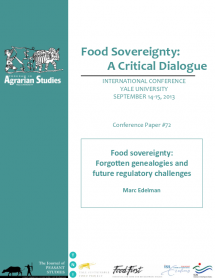Food sovereignty: Forgotten genealogies and future regulatory challenges
Advocates typically suggest that ‘food sovereignty’ is diametrically opposed to ‘food security’, but historically there actually has been considerable slippage and overlap between these concepts.

Authors
‘Food sovereignty’ has become a mobilizing frame for social movements, a set of legal norms and practices aimed at transforming food and agriculture systems, and a free-floating signifier filled with varying kinds of content. Canonical accounts credit the Vía Campesina transnational agrarian movement with coining and elaborating the term, but its proximate origins are actually in an early 1980s Mexican government program.
Central American activists nonetheless appropriated and redefined it in the late 1980s. Advocates typically suggest that ‘food sovereignty’ is diametrically opposed to ‘food security’, but historically there actually has been considerable slippage and overlap between these concepts. Food sovereignty theory has usually failed to indicate whether the ‘sovereign’ is the nation, region, or locality, or ‘the people’.
This lack of specificity about the sovereign feeds a reluctance to think concretely about the regulatory mechanisms necessary to consolidate and enforce food sovereignty, particularly limitations on long-distance and international trade and on firm and farm size. Several regulatory possibilities are mentioned and found wanting. Finally, entrenched consumer needs and desires related to internationally-traded products—from coffee to pineapples—imply additional obstacles to the localisation of production, distribution and consumption that many food sovereignty proponents support.
Marc Edelman, Professor of Anthropology, Hunter College and the Graduate Center, City University of New York Professor Edelman is the author of The Logic of the Latifundio (Stanford 1992) and Peasants Against Globalization (Stanford, 1999); co-author of Social Democracy in the Global Periphery (Cambridge, 2007); and co-editor of The Anthropology of Development and Globalization (Blackwell, 2005) and Transnational Agrarian Movements Confronting Globalization (Wiley-Blackwell, 2009). His current research focuses on the campaign to have the United Nations approve a declaration on the rights of peasants and other people working in rural areas.
Food Sovereignty: a critical dialogue, 14 - 15 September, New Haven.